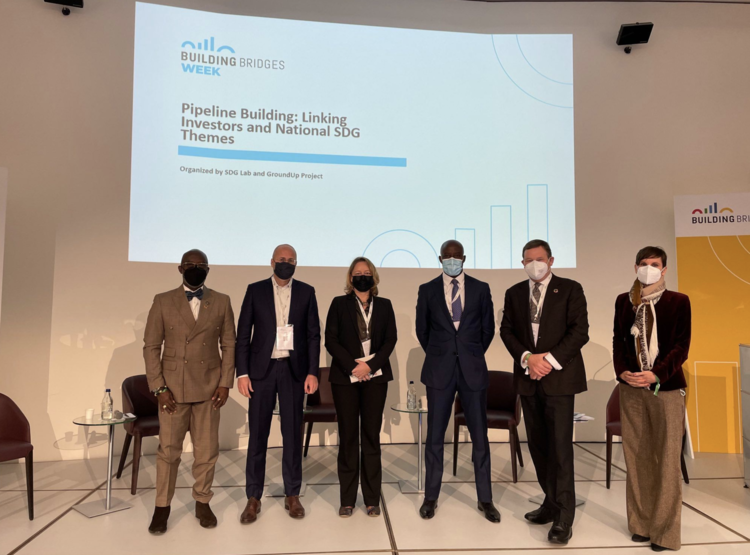Building Bridges 2021: Pipeline Builder panel spotlights Ghana’s potential

The West African Republic of Ghana has an ambitious sustainable development agenda. It includes programmes to eliminate poverty and hunger, expand high school education and health care, and provide clean water and decent housing for everyone. But achieving these SDGs may be wishful thinking if the government cannot persuade foreign investors to help finance the plan.
Ghana is eager to tap into the growing demand for investment strategies that generate social and environmental benefits alongside financial returns. Sustainable investing is one of the hottest trends in finance, but very little of the money is making it to the countries that need it the most. While unlocking capital for emerging and developing economies is crucial to achieving the Sustainable Development Goals, many barriers are hampering these financial flows.
Prominent on the list is an exaggerated perception of risk, said Xavier Pierluca, managing partner at Enabling Qapital, a Swiss investment firm focused on emerging markets.
“Generally speaking, there’s a perception of risk that is much higher than the risk itself,’’ he said. “It is actually in many cases less risky to invest in an SME (small to mid-sized enterprise) in Ghana with a local shareholder than investing in a bond or a listed equity stock on your stock market here (in Switzerland).”
Pierluca was part of a panel discussion, organized by the SDG Lab during the 2021 edition of Building Bridges Week in Geneva, on how to drive more capital to emerging markets. Much of the conversation revolved around Ghana as it is the focus of a pilot of the Pipeline Builder, an initiative to connect investors with opportunities in emerging markets and developing countries.
Building SDG pipelines
Launched in late 2019, the Pipeline Builder is a partnership between the SDG Lab and the Ground Up Project, a Swiss-based impact finance advisor. The aim of Pipeline Builder is twofold: One, to provide investors with a roadmap for turning country-level SDG priorities into investable opportunities that align countries’ specific development goals; two, to provide investors with real SDG-aligned investment opportunities more efficiently. Using a network of emerging market-based intermediaries, the Pipeline Builder can access opportunities on a global scale, which allows investors to build diversified portfolios of direct and fund investments in emerging markets at a lower cost and with potentially less risk.
Panel participants said investors often stop listening and their eyes glaze over when the talk turns to low-income countries. One reason for that attitude is performance pressure, which can make asset managers reluctant to tie up money in regions where investments tend to be illiquid and unlikely to generate short-term returns. But sustainable finance also lacks leadership, Pierluca said, with investors tending to follow the pack rather than taking risks in uncharted territory.
“We need to play on that herd mentality,” said Agi Veres, the UN Development Programme (UNDP)’s deputy director for Europe and Central Asia. “We need to get a first set of investors that will bridge that barrier.”
Panelists stressed the need to educate investors about market conditions in developing countries. UNDP is working to transform national SDG priorities into investor roadmaps. In April 2021, the organization introduced a platform that gives investors access to the market analysis underpinning the roadmaps. Ground Up leveraged the tool to identify US $55 million worth of small business investments in Ghana in the six months to September 2021.
